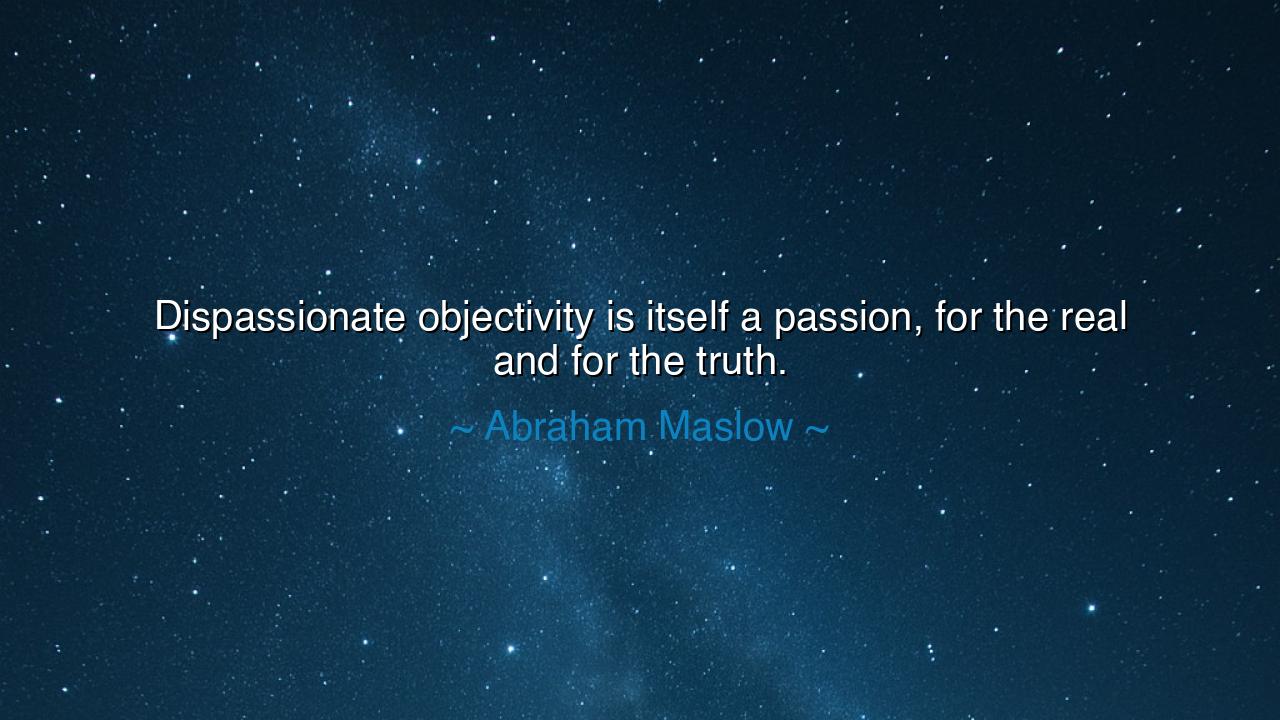
Dispassionate objectivity is itself a passion, for the real and






“Dispassionate objectivity is itself a passion, for the real and for the truth.” So spoke Abraham Maslow, a seeker of the human spirit, a man who sought to understand not only what men desire but what they may yet become. His words are no cold pronouncement, but a fire hidden in plain sight. For he teaches us that to look upon the world with clear eyes, unclouded by anger or prejudice, is not indifference, but a deep and fervent devotion—to reality itself, and to the shining flame of truth.
Many mistake objectivity for lifelessness, as though to observe without bias is to drain the soul of feeling. But Maslow unveils the paradox: to care so greatly for the real that one casts aside the chains of illusion is itself a mighty passion. To love the truth above comfort, above vanity, above victory, is no less fierce than the lover’s flame or the warrior’s zeal. It is the passion of the sage, the courage of the scientist, the devotion of those who dare to see what is, not merely what they wish to be.
Consider the life of Galileo Galilei. Surrounded by those who clung to tradition and dogma, he gazed at the heavens through a new instrument and saw what others denied: moons circling Jupiter, worlds in motion, a cosmos larger than imagination. To report these things demanded dispassionate objectivity—to see not what he was told to see, but what was there. Yet this was not coldness. It was burning passion for the truth, a loyalty to the real stronger than fear of imprisonment or the threat of exile. In his clear-eyed devotion, Galileo embodied Maslow’s teaching: true objectivity is aflame with reverence for reality.
But where men abandon this passion, darkness reigns. In the courts of power, flatterers often tell leaders not what is true but what is pleasing. They adorn lies with gold and disguise ruin as prosperity. Such men lack the sacred fire of objectivity, and their cowardice leads kingdoms into folly. History is filled with rulers who perished not from the sword of their enemies but from the poison of falsehood spoken by those too weak to love the truth. Thus Maslow’s words are both promise and warning: only in passionate objectivity can nations endure.
Children of tomorrow, mark this well: to be dispassionate is not to be without heart, but to guard the heart from being deceived. It is to hold your emotions like trained steeds—strong, yet reined in—so that they may serve the chariot of truth, not overturn it. To practice objectivity is to honor the world as it truly is, to befriend reality without disguise. This, Maslow says, is a passion worthy of the noble soul.
Let your practice, then, be this: when you look upon a matter, ask not what you wish it to be, but what it truly is. When anger rises, let it not blind you; when desire burns, let it not seduce you. Instead, bow to the truth as to a god, and let your loyalty be to the real, even when it cuts against your pride. In study, in judgment, in daily life, strive for this sacred clarity.
And know this final teaching: to be passionately objective is to be free. For the liar is bound by his lies, the partisan by his cause, the dreamer by his illusions. But the one who clings to reality walks unshackled, dwelling in the light. Thus, to live by Maslow’s wisdom is to walk the path of sages—to be both fierce and calm, both passionate and clear, both human and more than human. In the union of objectivity and passion, one finds the highest devotion: the love of the truth itself.






TTThao Tran
I find this perspective on objectivity interesting. Maslow seems to suggest that objectivity isn’t just about being neutral or detached but about having a deep commitment to uncovering the truth. Does this mean that anyone who seeks the truth with intensity is, in essence, passionate? How do we differentiate between true objectivity and the personal biases that often sneak in when we think we are being 'dispassionate'?
PMPhuong Minh
Maslow’s quote about dispassionate objectivity being a form of passion really resonates with me, especially in the context of research or decision-making. I often hear that objectivity is the goal, but what if the passion for truth and the pursuit of knowledge is more important than being entirely 'objective'? Can we truly separate our feelings from our quest for truth, or do they inevitably influence the way we see the world?
GDGold D.dragon
Abraham Maslow’s statement turns objectivity on its head. It makes me think that instead of being a detached stance, objectivity is rooted in a deep drive to understand what is real and true. But is it possible to be truly objective without any emotion or personal influence? Can we pursue truth without letting our own experiences or emotions shape it?
NVNam Van
This quote really makes me reflect on how we approach truth and objectivity. It implies that being objective is not about removing emotion, but rather channeling our passion for truth. But does this mean we can never fully escape our biases, even when trying to be objective? How can we make sure that our passion for truth doesn’t distort our view of reality?
Nngoc
I like how this quote frames dispassionate objectivity as a form of passion. It challenges the conventional idea that objectivity means being detached and emotionless. If objectivity is actually rooted in a passion for truth, does that mean we need a deep emotional connection to the truth in order to perceive it clearly? How do you think we can cultivate such objective passion in our everyday lives?